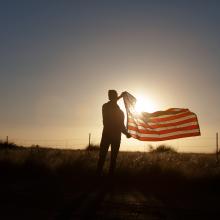biblical foundation

Photo via Alex Pix / Shutterstock
What does it mean to be exceptional?
Most people have to worry about making enemies. You know, they’re constantly freaked out that they might offend somebody or hurt somebody’s precious feelings. But I don’t worry about that. I’m exceptional. Other people in my family worry about everyone getting their fair share at the dinner table. They might really like mashed potatoes or lasagna, but they only take a normal small portion so that their sister or grandmother or cousin can have some too. But I don’t worry about those sorts of things. After all, I’m exceptional. I take as much as I want.
When you’re an exceptional nation, you want other nations to worry about your opinion of them. You don’t really care what their opinion is of you. When you’re a run-of-the-mill country, you’ll be nervous about going against the United Nations or the Geneva Conventions or the International Criminal Court and such, but when you’re an exceptional country, that sort of concern is beneath your dignity. You set expectations; you don’t fulfill them. Of course, with exceptional status comes exceptional responsibility, so we have the sole responsibility to drop nuclear bombs on nations that cause problems for the world—unexceptional nations, that is, which means everybody else but us. It’s a tough job, being exceptional, but somebody has to do it.
Between now and the elections in November, my guess is we’re going to hear the term “American exceptionalism” echoing from the mountains to the prairies to the oceans white with foam; echoing ad nauseum. It’s become a powerful political meme in recent years, popular but poorly defined. The history of the term aids and abets in its vagueness.
Thomas Jefferson repeatedly spoke of the United States as a unique—or exceptional—historical phenomenon. As a democratic republic, it differed from Europe, and all the nations of the past. Since then, of course, scores of nations have followed our example in forming democratic republics, so what was exceptional in Jefferson’s time has now, we might say, become the norm.
Does that make us “the nation formerly known as exceptional,” but now typical?
Yesterday, the U.S. and Canada celebrated Labor Day, a day honoring workers. What does it mean to honor workers at a time of high unemployment, job insecurity, and the threat of lay-offs? In the U.S., the unemployment rate remains just over 9 percent, with no decrease of the rate in August and the recovery of jobs apparently stalled. As President Obama prepares to deliver his "jobs speech" this week, he faces immense challenges.
In the U.S., the first celebration of Labor Day was held in 1882 in New York City, organized by the Central Labor Union. In Canada, Labor Day can be traced back even further, to when Toronto Typographers went on strike for a 58-hour work week in 1872. Religious leaders, both nationally and internationally, recognizing the sanctity of labor, joined labor leaders in calling for justice for workers. Pope Leo XIII, for example, issued Rerum Novarum (On the Condition of Labor) in 1891, building a biblical foundation for the dignity of the worker.